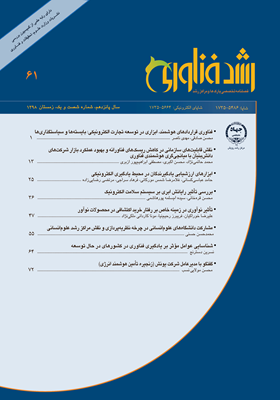مشاركت دانشگاههاي علوم انساني در چرخه نظريهپردازي و نقش مراكز رشد علومانساني
محورهای موضوعی : انتقال فناوري و تجاريسازي پژوهش
1 - علوم و تحقيقات
چکیده مقاله :
اگر چرخه نظريهپردازي را شاخص براي توليد دانش نهادهاي دانشگاهي در نظر بگيريم مشاركت دانشگاهها در حوزه علومانساني در توسعه علمي و نظريهپردازي از اهميت ويژه برخوردار خواهد بود. كارآمدي عملي نظريهپردازي، مشروط به عملياتيشدن دانش توليدشده و حركت آن از گام استدلال قياسي (نظريه هنجاري) به گام استدلال استقرايي (نظريه توصيفي) در چرخه نظريهپردازي ميباشد. بدينترتيب نظريهآزمايي در گام استدلال استقرايي را ميتوان مأموريت اصلي دانشگاه علوم انساني محسوب كرد. در اين چرخه، بيقاعدگيهاي ديده شده منجر به توليد دانش و نظريهپردازي و دستيابي به مرجعيت دانشگاه علوم انساني ميگردد. بمنظور حركت چرخه دانش از نظريه به واقعيت و تبديل دانش در چرخه نظريهپردازي از استدلال قياسي (نظريههنجاري) به استدلال استقرايي (نظريهتوصيفي) نيازمند هدفگذاري دانشگاهها بمنظور مشاركت و حضور آنان با مأموريتهاي متنوعي است كه بتوانند اين بيقاعدگيها را شناسايي و تبيين نمايند. اين بدين معني است كه در چرخه توليد دانش تمامي دانشگاهها از اهميت يكساني در توسعه علمي برخوردار هستند. با توجه به ماهيت ذاتي دانشگاههاي علوم انساني در ارتباط مستقيم با جامعه، ايجاد مراكز رشد علوم انساني ميتواند موجب ارتباط مستقيم اساتيد دانشگاهها با جامعه شده و توليد دانش بومي علوم انساني را سبب گردد. در واقع اين مراكز ميتوانند با راهاندازي كسبوكار در حوزه علومانساني با بهرهمندي از اساتيد دانشگاه علومانساني و ساير دانشگاهها موجب ارتباط با نهادهاي مختلف فرهنگي جامعه در راستاي مؤلفههاي الگوي بومي شوند. چنين ساختاري با رفع موانع توسعه نظام آموزش عالي، موجب تعريف اكوسيستم آموزشي در دانشگاههاي علوم انساني خواهد شد كه بسترساز نظريهپردازي مبتني بر دانش بومي در كشور خواهد گرديد.
Considering the Theorizing as an indicator for generating the knowledge of academic institutions, the participation of universities in the field of humanism in scientific development and theorization is of particular importance. The practical efficiency of the theory is conditioned on the operation of the generated knowledge and its movement from the step of analogical reasoning (normative theory) to the inductive argument (the descriptive theory) in the theoretical cycle. Thus, the Test theory in the inductive argument can be considered as the main mission of the Humanities University. In this cycle, the observed anomalies lead to the production of knowledge and theorizing and access to the authority of the Humanities University. In order to move the knowledge cycle from theory to reality and transforming knowledge into a theoretical cycle, from the deductive reasoning (normative theory) to inductive reasoning (descriptive theory), there is a need for universities to target the universities in order to participate in various missions that can identify and explain these abnormalities. This means that in the knowledge production cycle all universities have the same importance in scientific development. Given the intrinsic nature of Humanities Universities in direct relation with society, the establishment of Humanities Incubator can lead to direct association of university professors with the community and create the production of indigenous knowledge of humanities. In fact, these centers can connect with various cultural institutions of the society along the lines of indigenous patterns through the establishment of a business in the field of humanism through the use of professors from the university of humanities and other universities. Such a structure, by removing obstacles to the development of higher education system, will define the ecosystem of education in Humanities Universities, which will be the basis of the theoretization based on indigenous knowledge in the country.
1. حاتمي، جواد. چالش آموزش علوم انساني در دانشگاههاي ايران- يك مطالعه كيفي. فصلنامه پژوهش در نظامهاي آموزشي. شماره 32، 1395، صفحه 234-273.
2. شريعتمداري، علي. چگونگي ارتقاء سطح علمي كشور. انتشارات فراشناختي انديشه. تهران، چاپ اول، 1381، ص 4.
3. شوراي عالي انقلاب فرهنگي، مصوبه «سند دانشگاه اسلامی»، مصوب ۷۳۵، جلسه مورخ ۱۳۹۲-۰۴-۲۵.
4. عزيزي، نعمتالله، درآمدي بر توسعه آموزش عالي در ايران با تأكيد بر علوم انساني. پژوهشكده مطالعات فرهنگي و اجتماعي، چاپ اول، 1385، ص 45.
5. داناییفرد، حسن. روششناسی مطالعات دلالت پژوهی در علوم اجتماعی و انسانی: بنیانها، تعاریف، اهمیت، رویکردها و مراحل اجرا. فصلنامۀ روششناسی علوم انسانی، شماره 86، 1395، ص 39-71.
6. ذاکر صالحی، غلامرضا. دانشگاه ایرانی و مناقشه هویتی- کارکردی: در جستجوی الگوی گمشده. پژوهشنامه مباني تعليم و تربيت، شماره 7، 1396، ص 27-43.
7. آراسته، حميدرضا، اميري، الهام. نقش دانشگاهها در آموزش توسعهپایدار. نشاء علم. شماره دوم، 1391، ص 29-36.
8. هومن، حيدرعلي. شناخت روش علمي در علوم رفتاري، سمت، تهران، چاپ هشتم، 1396، ص 8.
9. كرلينجر، فرد، مباني پژوهش در علوم رفتاري. ترجمه حسنپاشا شريفي. جعفر نجفيزند. آواي نور، تهران، چاپ هشتم، 1393، ص 10.
10. عاليپور، عليرضا؛ عنايتي، ترانه. پيشنهاد مدل مراكز رشد زايشي علوم انساني دانشگاهي حركت به سمت دانشگاههاي نسل چهارم. فصلنامه رشد فناوري. شماره 39، 1393، 20-28.
11. Wissema, J. G. "Towards the Third Generation University": Managing the University in Transition. Edward Elgar Publishing, Cheltenham, UK, 1, 2009, 57-58.
12. Carlile, Paul R & Christensen, Clayton MThe: Using the Case Method to Build and Teach Management, Academy of Management Learning & Education Theory, Vol. 8, No. 2, 2009, 240 –251.
13. Lynton, Ernest A The Changing Nature of Universities, New England Journal of Public Policy, Volume 10, 1994, 241-250.
14. Merton, K Rober; bureaucratic structure and personality, University of North Carolina Press, 18, 1940, 560-568.
15. Rieckmann, Marco. Developing Key Competencies for Sustainable Development, International Journal of Sustainability in Higher Education, 8, 4, 416-430.
16. Dawe, G., Juker, R., Martin, S.” Sustainable Development in Higher Education: Current Practice and Future Developments” , A report for The Higher Education Academy. Available at:http://www.heacademy.ac.uk/assets/documents/sustainability/sustdevinHEfinalreport. 2005.
17. Mian, Sarfraz A., Assessing Value-added Contributions of Universty Technology Business Incubators to Tenant Firms, Elsevier, Volume 25, Issue 3, May 1996, Pages 325-335.


